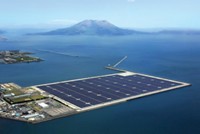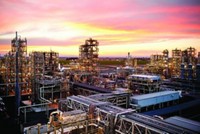Advertisement
Grab your lab coat. Let's get started
Welcome!
Welcome!
Create an account below to get 6 C&EN articles per month, receive newsletters and more - all free.
It seems this is your first time logging in online. Please enter the following information to continue.
As an ACS member you automatically get access to this site. All we need is few more details to create your reading experience.
Not you? Sign in with a different account.
Not you? Sign in with a different account.
ERROR 1
ERROR 1
ERROR 2
ERROR 2
ERROR 2
ERROR 2
ERROR 2
Password and Confirm password must match.
If you have an ACS member number, please enter it here so we can link this account to your membership. (optional)
ERROR 2
ACS values your privacy. By submitting your information, you are gaining access to C&EN and subscribing to our weekly newsletter. We use the information you provide to make your reading experience better, and we will never sell your data to third party members.
Business
Solar Woes Hit Chemical Firms
Renewables: Raw material suppliers pay price for solar industry’s overexpansion
by Michael McCoy
October 24, 2012

The financial woes of the solar power industry are starting to hurt the chemical companies that supply it with raw materials. In recent weeks, DuPont, Air Products & Chemicals, Evonik Industries, and Ferro Corp. have revealed setbacks in their solar materials businesses, and more bad news may follow as companies announce third-quarter results.
Until this year, the chemical industry benefitted as solar panel manufacturers across the globe expanded capacity with abandon. Now, a combination of overbuilding, notably in China, and reduced solar-installation subsidies from cash-strapped governments in the U.S. and Europe has brought on massive overcapacity.
Solar panel manufacturers have already been hit by plant closures and bankruptcies, and more consolidation is on the way, according to a new report from the market research firm GTM Research. Of the more than 300 worldwide photovoltaic module manufacturers analyzed by GTM, 180 will succumb to closure or acquisition by 2015, says senior analyst Shyam Mehta.
Hardest hit have been makers of thin-film panels manufactured by applying gaseous silane, or SiH4, to a glass plate to create a thin layer of amorphous photovoltaic silicon. Thin-film panels were all the rage in 2009 and 2010 because they were inexpensive to make. But when prices of competing products based on polycrystalline silicon fell last year, demand for thin-film panels collapsed.
Chemical companies are now paying the price. In announcing third-quarter results last week, DuPont said sales in its electronics and communications business fell 28%, primarily because of slumping demand for photovoltaic materials. The company took a $150 million pretax charge to reflect poor conditions in its DuPont Apollo thin-film solar module manufacturing business. It’s also eliminating 1,500 positions company-wide.
Air Products & Chemicals revealed in its quarterly earnings report that it is restructuring its photovoltaic materials business at a cost of $186 million before taxes. Among its actions, the company will pay $94 million to end a long-term contract to buy bulk silane for sale to the thin-film solar panel industry.
“For a variety of reasons, the thin-film photovoltaic market did not develop as the industry expected, resulting in global silane capacity of about four to five times global demand,” Paul E. Huck, Air Products’ chief financial officer, told analysts on a conference call. CEO John E. McGlade blamed Air Products’ investment in the field on a “terrible assessment of the market opportunity at a different point in time when the world looked a lot different.”
Similarly, Evonik and Japan’s Taiyo Nippon Sanso recently decided to end a silane production joint venture in Japan three years after forming it and only a year after their plant opened. Under a settlement agreement, the Japanese firm will pay Evonik around $250 million.
Providers of materials for polysilicon-based solar panels are hurting as well.
Wacker Chemie reported on Wednesday that third quarter sales in its polysilicon business fell 29% from the year-ago period. The company also announced that it is delaying completion of a polysilicon plant it is building in Charleston, Tenn., by about 18 months to the middle of 2015.
Last month, Evonik ended an agreement to sell trichlorosilane, a polysilicon raw material, to MEMC Electronic Materials after MEMC decided to idle a polysilicon plant in Merano, Italy. And Ferro revealed earlier this month that it may sell its business in conductive pastes, which are used to fabricate solar panels, because of poor demand. Ferro recorded a charge against earnings of up to $335 million to account for problems in its electronic materials unit.
Discussing DuPont’s electronic materials woes with analysts on a conference call last week, CEO Ellen J. Kullman affirmed the firm’s long-term faith in the photovoltaic business but acknowledged that problems will persist for some time. “We are believers that this industry has a solid future and will continue to get back, longer-term, to double-digit growth,” she said. “It’s just not going to happen in 2013.”




Join the conversation
Contact the reporter
Submit a Letter to the Editor for publication
Engage with us on Twitter